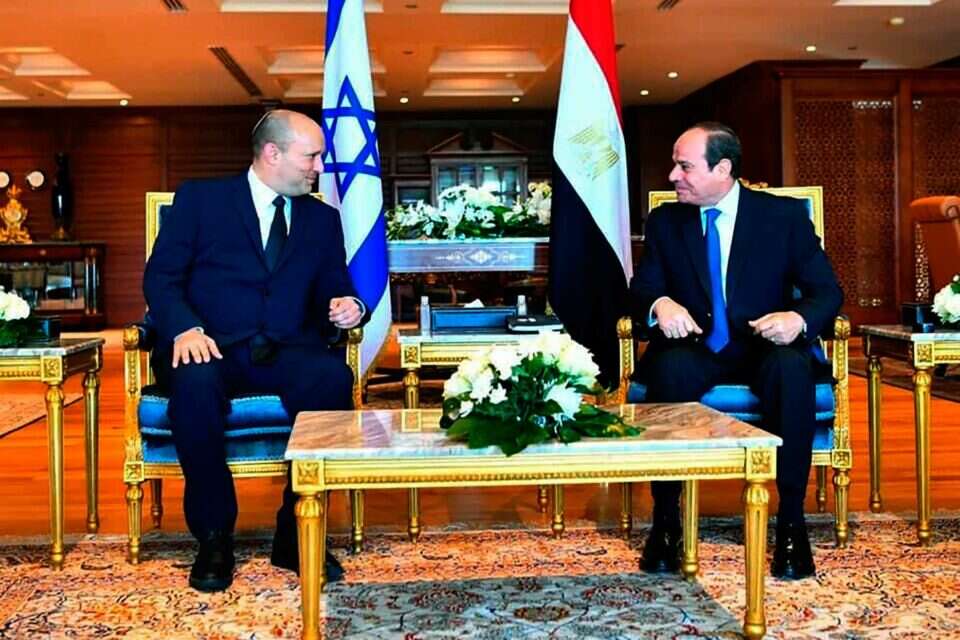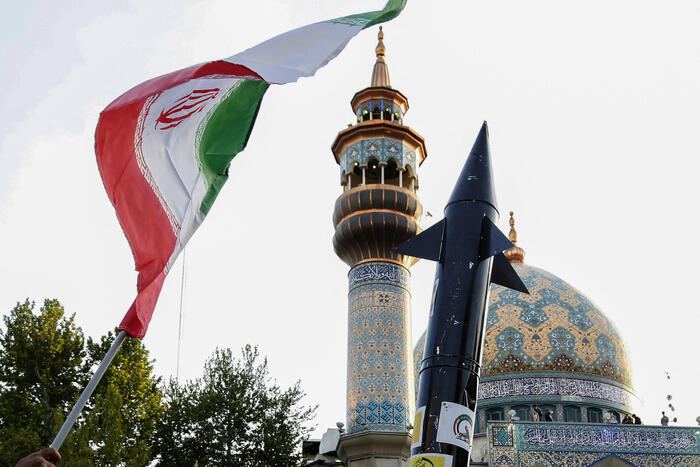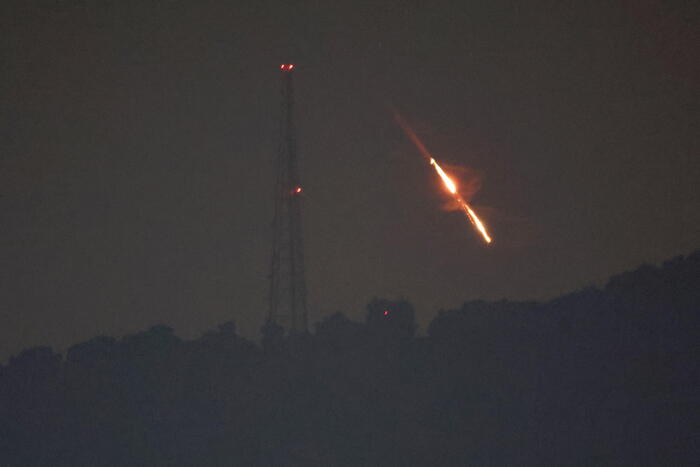The meeting held this month between Prime Minister Naftali Bennett and Egyptian President Abdel Fattah al-Sisi may not be a breakthrough - but it is an important discovery of a process that has been going on for more than 40 years, establishing Israel's status as a non-regional power. A negligible factor even in the global arena.Many have not yet become accustomed to this status and are examining Israel's political and strategic maneuvering space in terms that were acceptable in the previous era.
In the first decades after its independence, and even after the Six Day War, it was a small, weak, isolated and threatened country, held - along with its determination and military achievements - by the grace of European sympathy and reluctant US support, anchored by the Jewish community. Existential anxiety and sometimes a sense of impasse, which intensified in the shadow of the frustrations of the war of attrition and disappointment in the Yom Kippur War. "For whose benefit does time work?"
Milestone.
Peace agreement with Egypt / Photo: EP,
The turning point - the separate arrangement
The dramatic turning point occurred in the peace treaty with Egypt (1979). From the overall strategic picture, beyond mistakes and temporary setbacks, a very encouraging picture emerges: Worthy) the bulk of her desire for her enemies and rivals, in very difficult conditions in the regional and global arena. After forcing its independent existence on Arab states in 1948, by force and political maneuverability, this achievement was put to the critical test of the institutionalization, after Israel was forced to fight again in 1956 and 1967.
The real overarching goal of this struggle after the Six Days was to establish, in the first stage, an arrangement that would take Egypt out of the cycle of war. The test was a separate arrangement, which would force the Arab state that led the struggle against Israel to effectively abandon solidarity with Arab states and especially with the Palestinians, in a way that would leave them helpless vis-à-vis Israel. After a long and difficult struggle, which involved a painful blood price and spotty disappointments, in 1979 Israel achieved this goal in its entirety. In a broader perspective, it is desirable for Israel to exclude all its enemies, rivals and neighbors (and followers of fiction may fantasize about regional peace, a historic compromise with the Palestinian national movement and the Tooth Fairy) - but the separate peace treaty with Egypt is a necessary, early and critical condition for any other achievement. .
After the separate agreement with Egypt proved its resilience, Israel was able to devote most of its resources to building society, the economy and technology, deter its imminent Arab enemies, deal with the Iranian threat and build its position in the global arena. What determines the overall picture are not the repeated conflicts in the West Bank, Gaza and Lebanon (sometimes called "wars"), or political difficulties at the UN, in Europe and even in tensions in relations with the United States. What determines is the process by which the State of Israel is gradually strengthening, establishing a solid position in the region and in the world arena, and preparing for a confrontation with Iran. In the important and threatening confrontation with the revolutionary regime in Tehran, Israel is facing a difficult test, which is very far from the stage where its success can be summed up and judged. In the regional and global class (which is also very relevant to the ability to deal with Iran) - a significant interim summary can be drawn up.
The essence of this conclusion in the regional arena is an ongoing and consistent process, in which most Arab countries come to terms not only with Israel's existence, but also with its leading position in the region and with the important potential contribution of close relations with Israel to their vital interests.
In a broader international context, Israel's achievement focuses on the recognition of most of the important forces - the United States, China, India, Japan, Russia and even Europe - in the regional importance of Israel, and in its unique position at the forefront of technology. .
Guarantee that stands the test.
Rabin and King Hussein / Photo: Yaakov Saar / GPO,
Between strength and weakness
Following the turning point in Israel's status in the Middle East - the separate peace treaty with Egypt - began a lengthy process of institutionalizing this turning point, which has gained critical mass in the last decade. This historic achievement was promised in a meeting between the success of the Zionist enterprise and Israel's national strategy, and the structural failures of Arab society and the impasse to which the pan-Arab national strategy led its countries.
The Zionist enterprise put at the top of the agenda the building of the nation of the Jewish people gathered in its historical homeland, also at the expense of exercising their national rights he claimed (for example, on the question of the integrity of the land, including Jerusalem). After more than a hundred years of adhering to this national strategy, and despite occasional errors and deviations from it, a functioning, free, prosperous and robust society was built in Israel, which integrates well with the modern world. It has succeeded in combining prudent and flexible political conduct, and a willingness to defend its vital needs even by forceful means, which are no longer acceptable among its valued partners and also in conditions of isolation in the international arena. This combination enabled her to withstand both the major attempts of breaking her enemies and the major bending efforts of her partners. Thus, for example, it ensured the full realization of its demand to remove Egypt from the equation of strategic threats, both at the cost of painful wars and at the cost of pressure and friction with those who tried to force Israel to abandon its bargaining assets in exchange for political deception (e.g.A declaration of non-war called a "peace agreement") that looked good at the time.
Arab society, on the other hand, has not built a solid social, economic and national base that will allow it to close the gaps with the developed world and establish participatory regimes and a stable regional order. National resources (mainly oil) were wasted in extreme corruption and civil wars. Its failures were revealed in the "Arab Spring," when it became clear that the removal of autocratic and failed rulers in a popular revolution only brings to power, widespread public support, rigid dictators and regressive social forces, or leads to chaos, civil wars and even social disintegration. What is new in its power are the widespread revelations in the Arab public of the loss of hope for a better future: the pervasive recognition that even this failed existence is in danger of degenerating into a heavier catastrophe.
The combination of these two - the recognition of Israel's power and the misery of the Arabs - changed the strategic architecture of the region.
Understanding the depth and political potential of this change over the past decade has enabled the profound change that has established the new balance of power in recent years.
The infrastructure was laid in the days of Sadat, Golda, Rabin and Begin.
The foundations were cast and strengthened in the days of Trump and Netanyahu.
Recently, Lapid and Bennett, and in their hearts and minds even in Linken and Biden, have been trying to build the next tier on them.
Existential anxiety.
The Yom Kippur War / Photo: AFP,
US weight
After the arrangements with Egypt and Jordan proved their resilience, the important, but limited, role of the United States gradually became clear. Even at the behest of the American president.) The Jordanian wing was promised with the help of Clinton, but mainly because Hussein bravely took advantage of the semblance of a settlement with the PLO. Arrangements with the Emirates, Bahrain, Sudan and Morocco have been achieved thanks to Trump's revolutionary policies and Kushnir's creative mediation. The goal was achieved despite eight years of harmful policies in the days of Obama, based on a misunderstanding of the founding forces in the Middle East: Obama pinned his hopes on reconciling radicals, Iran, Erdogan and the Muslim Brotherhood, at the expense of his traditional allies - Israel, Saudi Arabia And Egypt - and saw the establishment of a Palestinian state as a precondition for stabilizing the region and calming it.
Trump, encouraged by Netanyahu, was able to build on these Allies' fears of Obama's policies, and advocated the opposite view, which sought to isolate Iran and the "brothers", to ignore the Palestinians and to express, in an open Israeli-Arab alliance, the common interest of pro-American elements In the area. The weak response to his revolutionary moves in Jerusalem and the Golan Heights, and the expanding legitimacy of open contacts and public cooperation with Israel, proved the validity of his views. It turns out that the US is successful when it fully understands the reality in the region and acts in unison with its allies such as Nixon, Kissinger and Trump (and also Carter after the Sadat initiative), and fails when it acts against them (in the days of Carter before the initiative and in Obama).
The combination of Israel's success and the Arabs' recognition of their weakness fundamentally changed its strategic position in the region.
Once its former enemies realized that without relying on the power, determination and credibility of the Jewish state - would be prey to the hegemonic aspirations of Iran and Turkey, they were also willing to risk a public response to take cooperation with Israel "out of the closet."
They risked it, because they knew how much the taboo had been eroded and how many Western observers were exaggerating, that their unfounded fear of the revelations of "Arab rage" preserved for the radicals some of the veto power still in their hands.
Consider the Israeli consideration
The same combination - Israel is getting stronger and Arabs are weakening - also explains Israel's dramatic strengthening in the world arena. For many years, the fear of harming the interests of the factors that determine this arena in the Arab and Muslim world was the main obstacle that made it difficult for them to realize the potential of the partnership with Israel as a developed and strong state. Gradually not only Americans and some Europeans but also the Chinese, Japanese, Indians, Russians and many others internalized that the rules of the game had changed.
The change took place mainly in three areas: the first is derived from the recognition of Israel's exceptional contribution as a cyber, intelligence, science, technology and innovation power, which is difficult to ignore. The second concerns the internalization of the fact that Arab countries have lost much of their importance due to the internal weakness and sometimes even the violent disintegration of their societies, and have lost much of their economic and political weight, due to US energy independence. It also involves the loss of markets and connections among the main factors in the Arab world, which themselves seek to rely on important contributions from Israel.
When all this joins the understanding of Israel's strategic position in the Middle East - the calculation is simple: paradoxically, today a country that wants to deepen its relations with the Gulf states must also take into account Israel's considerations, which are in a de facto strategic alliance with Iran. Those who want ties with Egypt should be aware of Egypt's strategic proximity to Israel, in the face of Erdogan's aggression in the eastern Mediterranean basin, and updated on the intersection of their interests with Hamas in Gaza and the fight against the Islamic State in Sinai. Anyone who wants to defend Jordan knows how critical the Israeli guarantee is to the existence of the Hashemite Kingdom and how it has repeatedly stood the test. Even Putin, who seeks to establish his position among radicals in the region by violent means, understands that he needs to understand the people of Israel, to ensure that moves that are particularly important to him do not go awry.
Other countries in the world arena see the improvement of access to Israel among the powers, and cannot or do not want to "stay out" in the field of relations with it. Israel is indeed isolated on the multilateral level, in the circus of international organizations, but on the bilateral level its status is in an accelerated process of marked improvement in almost all parts of the world.
It is worth concluding this optimistic review with two important warning notes.
One, during the confrontation with Iran and its envoys, Israel could be severely damaged in a way that would significantly change the picture presented here, especially if the Biden administration adopts a conciliatory policy like that of Obama, despite the hesitations shown by the administration after its failure in Afghanistan and / or China's implementation of the strategic agreement. The Iranian economy despite, and perhaps thanks to, its regional aggression.
Second, Israel has a series of internal problems (for example, with an unproductive ultra-Orthodox population with extreme rates of proliferation) that at this stage do not yet overshadow the achievements and resilience of society, on which the entire strategic success structure is based.
If these get out of hand, the entire structure will not be able to stand for long.








